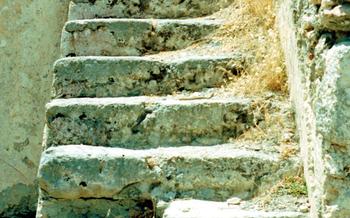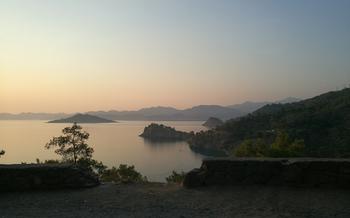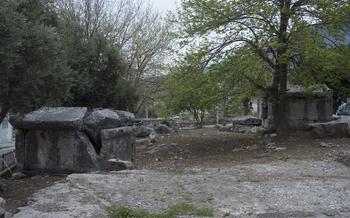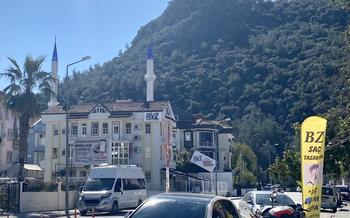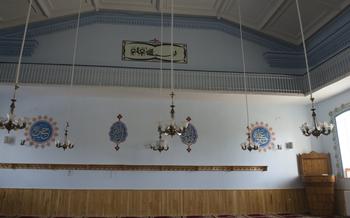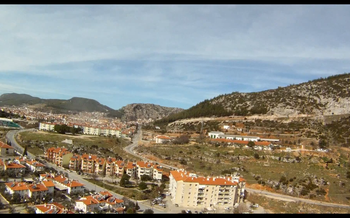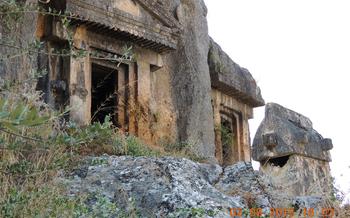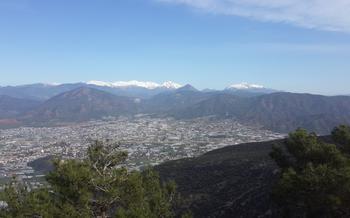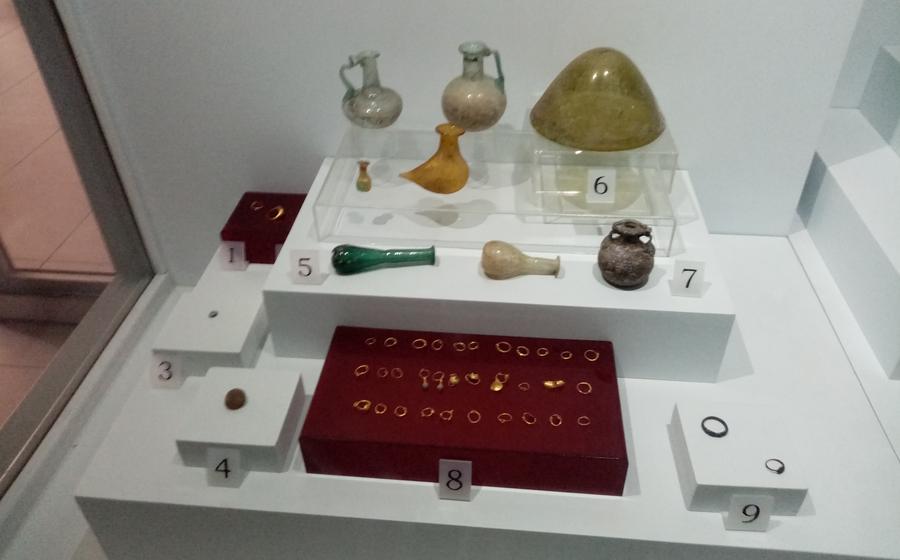
Fethiye Museum
- Fethiye Museum: A Journey Through History and Culture
- Location and Accessibility
- Guided Tours and Audio Guides
- Admission Fees and Hours of Operation
- Exhibitions and Events
- Accessibility for Visitors with Disabilities
- Educational Programs and Workshops
- Museum Gift Shop and Souvenirs
- Photography and Social Media
- Food and Refreshments
- Restrooms and Facilities
- Nearby Attractions and Points of Interest
- Respecting the Museum's Rules and Regulations
- Insider Tip
Fethiye Museum: A Journey Through History and Culture
Historical Overview
Fethiye, the former Telmessos, boasts a rich and storied past, dating back to ancient times. The Fethiye Museum is a treasure trove of artifacts and exhibits that tell the story of this ancient city and the surrounding region. Founded in 1987, the museum houses a diverse collection that spans various civilizations and periods, from the Neolithic era to the Ottoman Empire.
Steeped in history, Fethiye was once a prominent port city in ancient Lycia, renowned for its oracle, the Temple of Apollo, and its strategic location. The museum's exhibits showcase the legacy of this ancient city, including impressive Lycian sarcophagi, intricate sculptures, and remnants of the Temple of Apollo.
The Fethiye Museum plays a vital role in preserving and showcasing the cultural heritage of this region. Its collection offers a glimpse into the lives, beliefs, and artistic expressions of the diverse civilizations that have shaped Fethiye's history. As a must-visit destination for history buffs and culture enthusiasts, the Fethiye Museum promises a journey through the ages, where visitors can discover the rich tapestry of this ancient land.
Location and Accessibility
The Fethiye Museum is conveniently situated in the heart of Fethiye, a charming town on the Turquoise Coast of Turkey. It is located on Cumhuriyet Meydanı, the main square of the city, making it easily accessible on foot or by public transportation. The museum is a short walk from the Fethiye Castle and the vibrant Paspatur Old Town, allowing visitors to combine their visit with a stroll through the historic streets and lively markets.
For those arriving by car, there is ample parking available in the nearby streets. Visitors can also take advantage of the public transportation system, which offers regular bus services to the museum from various parts of the city. The museum's central location makes it an ideal starting point for exploring Fethiye's many other attractions, including the Fethiye Marina, the Çalış Beach, and the Saklıkent Gorge.
Guided Tours and Audio Guides
The Fethiye Museum offers guided tours in various languages, providing visitors with the opportunity to gain insights and knowledge from experienced experts. These tours allow visitors to delve deeper into the history and significance of the artifacts on display. Knowledgeable guides share captivating stories and explanations, bringing the museum's collection to life. Guided tours can be booked in advance or arranged upon arrival, subject to availability.
For those who prefer a more self-guided experience, the museum provides audio guides in multiple languages. These audio guides offer informative commentary on the exhibits, allowing visitors to explore the museum at their own pace. The audio guides are easy to use and can be rented at the museum's front desk.
Admission Fees and Hours of Operation
The Fethiye Museum charges a modest admission fee for entry, which helps support its conservation efforts and educational programs. Regular admission tickets are priced at 20 Turkish Lira (TRY) for adults, while discounted rates are available for students, seniors, and children. The museum is open to the public from Tuesday to Sunday during the summer months (April to October), and from Wednesday to Sunday during the winter months (November to March). Its hours of operation are typically from 8:30 am to 5:30 pm, but it's recommended to check the museum's official website or call ahead for the most up-to-date information, especially during holidays or special events.
Exhibitions and Events
In addition to its permanent collection, the Fethiye Museum hosts a variety of temporary exhibitions and special events throughout the year. These exhibitions showcase a diverse range of topics related to Fethiye's history, culture, and art. Past exhibitions have included retrospectives of local artists, displays of ancient artifacts from archaeological excavations, and thematic exhibitions on specific historical periods or cultural traditions.
The museum also organizes regular events such as workshops, lectures, and film screenings. These events provide an opportunity for visitors to engage with experts, learn about different aspects of Fethiye's heritage, and participate in hands-on activities. Workshops often focus on traditional crafts, such as pottery, weaving, or calligraphy, allowing visitors to experience the region's rich cultural traditions firsthand.
To stay updated on upcoming exhibitions and events, visitors are encouraged to check the museum's website or social media pages. By planning their visit to coincide with a special event or exhibition, visitors can enhance their museum experience and gain a deeper understanding of Fethiye's diverse cultural heritage.
Accessibility for Visitors with Disabilities
The Fethiye Museum is committed to providing an inclusive and welcoming environment for all visitors, including those with disabilities. The museum is fully accessible, with ramps, elevators, and accessible restrooms available throughout the building. Visitors with disabilities can also request special services or assistance from the museum staff. The museum's staff is trained to assist visitors with disabilities and to ensure that they have a positive and enjoyable experience. The museum also offers a variety of educational programs and workshops that are designed to be inclusive and accessible for visitors with disabilities.
Educational Programs and Workshops
The Fethiye Museum offers a range of educational programs and workshops designed to engage and inspire visitors of all ages, particularly children and families. These programs provide an opportunity to delve deeper into the history, culture, and traditions of Fethiye and its surrounding region. Past programs have included history workshops, art classes, storytelling sessions, and hands-on activities related to archaeology and ancient crafts. The museum's education department regularly updates its offerings, so it's recommended to check their website or contact them directly for the latest schedule. By participating in these educational programs, families can enhance their museum experience and create lasting memories while fostering a love for history and culture in their children.
Museum Gift Shop and Souvenirs
The Fethiye Museum houses a well-curated gift shop that offers a diverse selection of souvenirs and mementos for visitors to cherish their visit. From intricately designed replicas of ancient artifacts to locally-crafted handmade souvenirs, the gift shop caters to a variety of tastes and budgets.
One of the highlights of the gift shop is the collection of replica artifacts, meticulously crafted to resemble the museum's prized exhibits. These replicas, ranging from miniature Lycian sarcophagi to delicate bronze statuettes, allow visitors to take home a piece of Fethiye's rich history and culture.
The gift shop also features an array of handmade crafts created by local artisans, showcasing the region's vibrant artistic traditions. Visitors can find unique pottery, handwoven textiles, and intricate jewelry, each piece a testament to the skill and creativity of Fethiye's craftsmen and women.
Supporting the museum by purchasing souvenirs from the gift shop not only contributes to its financial sustainability but also directly supports educational programs and conservation efforts. Visitors can feel good about their purchases, knowing that they are contributing to the preservation and promotion of Fethiye's cultural heritage.
Whether seeking a meaningful souvenir or a special gift for loved ones back home, the Fethiye Museum gift shop offers a treasure trove of unique and authentic items that will serve as lasting reminders of a visit to this historic and captivating city.
Photography and Social Media
The Fethiye Museum encourages visitors to capture their experiences and share them on social media. Photography is allowed within the museum, but visitors must respect the guidelines and restrictions in place to ensure the preservation of the artifacts. Using flash photography or tripods is not permitted, and visitors should avoid touching or leaning on the exhibits. By using relevant hashtags and tagging the museum's official accounts, visitors can connect with other travelers, share their photos, and discover hidden gems in Fethiye. Social media platforms offer a great way to engage with the museum, learn more about its history and collections, and share the beauty of Fethiye's cultural heritage with the world.
Food and Refreshments
The Fethiye Museum does not have its own café or restaurant, but visitors can find a variety of food and beverage options nearby. Just a short walk from the museum, visitors will find a selection of local restaurants serving traditional Turkish cuisine, as well as international fare. For a quick bite, there are several cafes and coffee shops in the vicinity, offering sandwiches, pastries, and refreshing beverages.
To fully immerse themselves in the local culture, visitors can try some of the regional specialties, such as "meze" platters with a variety of small dishes, grilled kebabs, and fresh seafood. For a sweet treat, traditional Turkish desserts like baklava and künefe are must-try delicacies.
Visitors are also welcome to bring their own snacks and drinks to enjoy during their visit. However, it is important to be mindful of the museum's rules and regulations, which may prohibit eating or drinking in certain areas.
By exploring the culinary delights of Fethiye, visitors can enhance their museum experience and gain a deeper appreciation for the region's rich cultural heritage.
Restrooms and Facilities
The Fethiye Museum provides clean and well-maintained restrooms for the convenience of its visitors. These facilities are accessible from within the museum and are designed to accommodate visitors of all abilities. Baby-changing stations are also available in the restrooms, making it a family-friendly destination. Visitors are kindly requested to respect the facilities provided and maintain cleanliness for the benefit of everyone. It is advisable to utilize the restrooms before and after your visit to avoid any inconvenience during your exploration of the museum's exhibits.
Nearby Attractions and Points of Interest
The Fethiye Museum is strategically located in the heart of the city, surrounded by a wealth of other attractions and points of interest. A short walk from the museum, visitors can explore the imposing Fethiye Castle, a 16th-century fortress that offers panoramic views of the city and the surrounding landscape. The Old Town, with its charming cobblestone streets, traditional Ottoman houses, and lively bazaars, is another must-see destination. Here, visitors can immerse themselves in the local culture, indulge in delicious Turkish cuisine, and shop for unique souvenirs.
The Fethiye Marina, located just a stone's throw from the museum, is a vibrant hub of activity. Visitors can admire the sleek yachts docked in the harbor, enjoy a leisurely stroll along the promenade, or indulge in a delightful meal at one of the many waterfront restaurants. For those seeking adventure, boat tours depart regularly from the marina, offering the chance to explore the stunning coastline, secluded bays, and picturesque islands that dot the turquoise waters of the Mediterranean Sea.
Beyond the immediate vicinity of the museum, Fethiye offers a diverse range of attractions for visitors to discover. The city is surrounded by pristine beaches, inviting visitors to bask in the warm sunshine, swim in the crystal-clear waters, and engage in various water sports such as snorkeling, diving, and kayaking. Nature enthusiasts can venture into the nearby mountains, where they can explore lush forests, hike scenic trails, and marvel at breathtaking views. Fethiye is also a gateway to some of Turkey's most impressive natural wonders, including the Saklikent Gorge, a spectacular canyon with towering cliffs and refreshing waterfalls, and the Ölüdeniz Blue Lagoon, renowned for its tranquil turquoise waters and idyllic beach.
Respecting the Museum's Rules and Regulations
It is crucial to respect the museum's rules and regulations to ensure a pleasant and safe experience for all visitors. These rules are in place to protect the museum's artifacts and contribute to its overall atmosphere. Visitors should refrain from touching or climbing on exhibits, as this can damage or destroy them. It is also important to be mindful of noise levels and refrain from talking loudly or disturbing other visitors. By following these guidelines, visitors can contribute to the preservation of the museum's collection and ensure that everyone has a positive experience.
Insider Tip
As an insider tip, make sure to visit the Fethiye Museum during the off-season (November to March) to avoid the crowds and enjoy a more intimate experience. During this time, you'll have the opportunity to engage with the museum staff, who are always eager to share their knowledge and stories about the exhibits. Additionally, keep an eye out for special events and workshops that the museum hosts throughout the year, as these offer a unique chance to delve deeper into Fethiye's rich history and culture.
